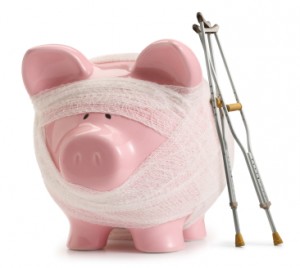How would you rate your financial health? Most of us would like to have more money, but we don’t necessarily think of ourselves as financially fragile. Yet the harsh reality is that faced with a financial challenge, many American families simply can’t come up with the cash that they need.
 The ability of the average American family to rise to the challenge of an unexpected financial need was tested by a study performed by the National Bureau of Economic Research. The study took the form of a survey which asked, “If you were to face a $2,000 unexpected expense in the next month, how would you get the funds you need?” The results are a shocking indictment of America’s poor financial health.
The ability of the average American family to rise to the challenge of an unexpected financial need was tested by a study performed by the National Bureau of Economic Research. The study took the form of a survey which asked, “If you were to face a $2,000 unexpected expense in the next month, how would you get the funds you need?” The results are a shocking indictment of America’s poor financial health.
Why $2,000?
What’s the point of asking about $2,000 when America faces so many other challenges? The $2,000 represents the most common financial nightmares of the American people – a large car repair bill, a minor medical emergency, or an unexpected home repair job. It’s not an unimaginably large sum of money, but it turns out that for nearly 50% of all Americans, that $2,000 might as well be a million bucks.
Almost 28% of the respondents stated that they would be “certainly unable” to come up with the $2,000, even if given thirty days to do so. Another 22.2% said that they would be “probably unable” to come up with the money. Only 24.9% said that they would be “certainly able” to find the funds.
Along with asking about Americans’ ability to meet financial challenges, the study also asked about what methods individuals would use to try and come up with the money. Again, the answers were eye opening and disappointing for those who think of America as a prosperous nation with deep pockets.
More than a 25% of respondents said that they would come up with the money using methods that could be considered to be emergency measures. This included pawning possessions, taking out a payday loan, or attempting to sell their home in response to the emergency. (There was no word on those who would sell plasma or take illegal actions for cash.) Other respondents indicated that they would turn to their credit cards or borrow from family and friends. Only a small percentage indicated that they would dip into existing savings to get their $2,000.
How to improve?
The study’s authors note that the U.S. ties with the UK and Germany as the developed nation least able to cope with financial stress at a household level. Canada, our neighbor to the north, ranks among the top three best-able nations. How then can Americans work to improve their ability to have access to emergency funds, especially in a tough, tight economy?
One of the first steps is for families to face facts when it comes to emergency funds. All too often, the “emergency” credit card is already maxed out and there’s no cash on hand in your time of need. Rainy day got turned into pay-the-bills money long ago, so it’s no good thinking there’s an emergency plan if the proverbial piggy bank is empty.
The next step is to try to build financial flexibility. Those most able to cope with an unexpected financial emergency had the flexibility of tapping multiple sources for the needed funds before going to extreme measures. They had savings, credit lines, or willing family members. While it’s not always possible to rely on family pocketbooks, keeping a reserve credit line available can be easier than building up a cash stock, although a solid savings account is always useful in an emergency.
Finally, consider your monthly needs. According to the study, even low-income families need to have at least $1500 in savings for emergencies to avoid a state of constant crisis. Depending on regular bills and living expenses, each family needs its own plan. A fund equal to three months of total expenses is considered an ideal minimum, but the more families are able to put away, the sooner more individuals can move out of the “financially fragile” category.
The data for the study was published in 2011, but the data was collected in 2009. Since then, the numbers may have shifted significantly. Dare we hope that things are better?
—————————————————————————-
90 Minutes to Debt Free
No Loans or Bankruptcy Necessary
—————————————————————————-
 Off The Grid News Better Ideas For Off The Grid Living
Off The Grid News Better Ideas For Off The Grid Living




